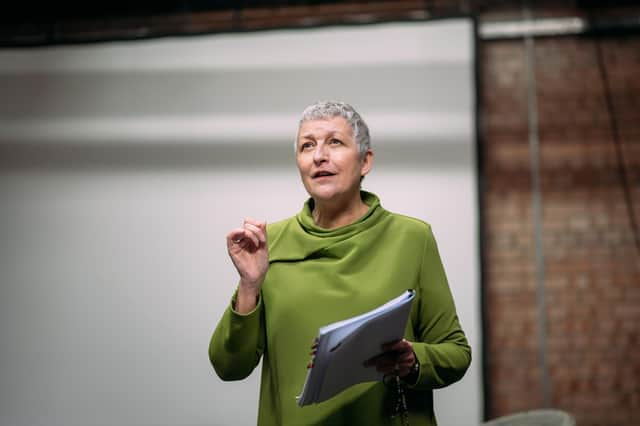Theatre: Blythe Duff on Escaped Alone at the Tron: ‘What she has written feels so prescient’


Had we tried to run an article before Christmas about Blythe Duff’s latest role, the former Taggart actor would have had little to say. Even a week into rehearsals at Glasgow’s Tron, she would have been at a loss for words.
Had we tried to run an article before Christmas about Blythe Duff’s latest role, the former Taggart actor would have had little to say. Even a week into rehearsals at Glasgow’s Tron, she would have been at a loss for words.But today, another week on, she is lucid and passionate. She has transformed from being cautious about Escaped Alone, a 2016 play by Caryl Churchill, into a forceful advocate.“There’s no way I could have spoken to you about this last week,” says Duff. “I couldn’t give you any context or soundbite or anything for you to take away to get closer to it.”She adds: “Before Christmas I was saying to people, ‘I’ll let you know if you should come.’ I didn’t honestly know if we could pull it off and I now feel so much more comforted. So please do come!”If Duff was perplexed, it is not without reason. Churchill is regarded as the UK’s most brilliant and adventurous playwright, with a gift for being at once accessible and disarming. At first sight, Escaped Alone appears to be about nothing more than a group of women in their 70s idly chatting in a suburban back garden.That in itself becomes a tantalising proposition when you know those women are played by Scottish theatre stalwarts Anne Kidd, Irene Macdougall and Joanna Tope, as well as Duff herself. “Caryl Churchill has not been at all daft in thinking this is the time for older women to take centre stage,” says Duff. “I think older audience members are thinking, ‘But what’s for us? Is there a play out there that we will really get and that’s geared for us?’ This play is geared for a big wide audience but there’s something about an older audience seeing four women reflecting their lives.”But in Churchill’s highly theatrical world, nothing is at it seems. Every so often, the women break off to share their interior thoughts. Duff’s character, the otherworldly Mrs Jarrett, repeatedly takes over with a distressingly apocalyptic tale. An innocuous afternoon chat becomes altogether darker. The talk turns to famine, chemical leeks and violence. It is, according to one critic on its debut, “domestic and wild”.“We have to remind ourselves that when this was written, they didn’t know we would go through a global pandemic,” says Duff. “What she has written feels so prescient. There are certain phrases that I didn’t know until three years ago, words that I now use. It is so salient and ahead of its time. Perhaps there’s now enough of a window for us to ask, ‘How did we cope with that? Where has it settled within our bodies and heads?’ For a while we stopped talking about the pandemic and now we’ve all come back round to it.”Sitting next to her in a rehearsal break, director Joanna Bowman agrees it has been a hard play to crack. “Our brains are being stretched in lots of difficult directions by Caryl Churchill and that’s a joy,” she says.“She writes in such a particular way for each character,” says Duff. “Her punctuation – or lack of – is really interesting. Her layout on the page is really interesting. That’s the forensic work that I’ve found joyous – to sit and work out the fragmentation of how she writes. We all have monologues and I have statements – full stop, full stop, full stop, all over it. Another character has only commas. Another one has a lot of space on the page, a chance for her to reflect.”When Bowman talked to Churchill about Escaped Alone, the playwright said she had attempted to reflect the way women speak. “The play is expressing something that is distinct, particular and maybe even peculiar to women,” says Bowman, who has given the production a Scottish setting. “Even how it’s written – the interruptions and the finishing each other’s sentences feels very female. Caryl does this brilliant thing where that which is not said takes up all of the space. We hear the top line of conversation, but she makes the unsaid said. That’s a particularly female thing to walk around with acres of unsaid stuff.”For the actor, this demands a high degree of precision. In the same way Samuel Beckett made every word count, so Churchill writes with an attention to detail you overlook at your peril. “If you don’t follow the recipe, you’re missing a trick,” says Duff. “She sets it out in such a way that you go, ‘This is your key now.’ She might not give you the answer, and I might never find the answer, but it’s really exciting to mine it. The energy of it is extraordinary.”From the directorial point of view, this means trusting the heart as well as the head. “You know when you’re getting it right,” says Bowman. “You feel it somewhere in the body. That’s because it is so precisely and carefully written. You feel it more bodily than intellectually when it’s right, even though we’ve been doing a hell of a lot of intellectual work. You do all that work and then you forget it because you need it to be much more visceral. It’s proper theatre where the doing matters.”And being proper theatre, it promises to unsettle as much as entertain. “I’m not sure that everybody will adore it,” says Duff. “People will find themselves challenged and provoked, and hopefully it evokes some feeling in them, but I’m not sure they’ll go, ‘Oh, that was great.’ And that’s exciting too!”Escaped Alone, Tron Theatre, Glasgow, 22 February-9 March.